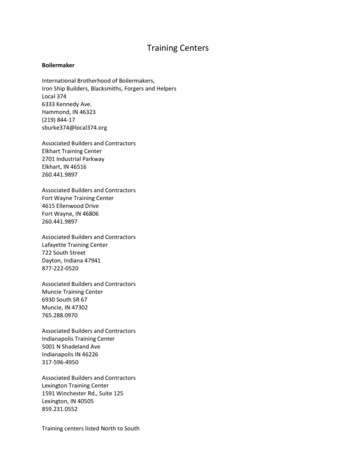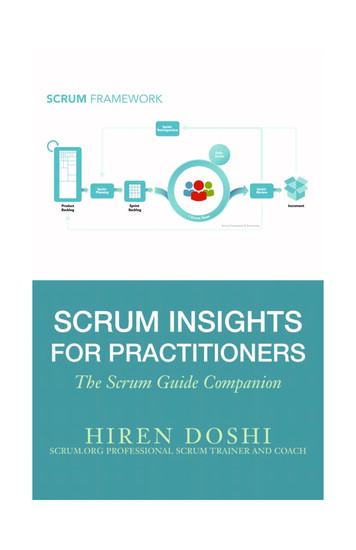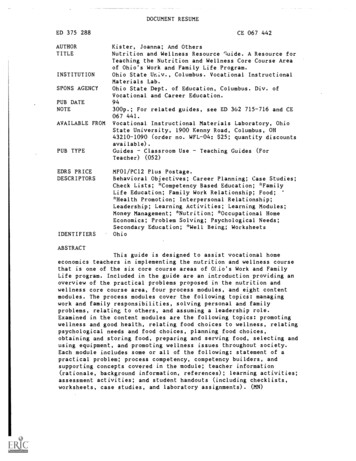
Transcription
research.hackerrank.comInsights based on39,441 developers39,441 developerstook the survey01
H AC K ER R A N KTable of Contents 01Prologue02Learning & Education1 in 4 developers started coding before they could driveNearly all developers have an insatiable thirst for learning03In-Demand QualificationAlmost all employers prioritize problem-solving skills firstWhat you do matters more than what’s on your resume04Talent AttractionHiring challenge and assessment toolsWork-life balance beats perksFlexible work schedules are huge02
PR O LO GU EH AC K ER R A N KHello World The future of work will be very different. Irrespective of your job, it will becomeimportant for everyone to learn how to code. Coding helps enrich yourcomputational thinking, which is powerful in making decisions. The traditionalresume will go away and hiring will happen based on your skills first.We launched HackerRank in late 2012 with the goal of matching every developer tothe right job. And the growth has been amazing — we reached 3.2M developers inthe community and powered 2% of all developer hires last year.For the first time, we surveyed the HackerRank community to get a pulse ondeveloper skills (when did they push code for the first time, how do they learncoding, what are the favorite languages and frameworks, what do they want ina job, what hiring managers want in a candidate, and more). There are somegreat insights, from 39,441 responses, that we are happy to share with you today.Did you know that 1 in 4 developers learned to code before they could drive?We hope you find the 2018 Developer Skills Report insightful and would love todiscuss the findings with you. E-mail us at research@hackerrank.comVivek RavisankarCo-founder & CEO03
L E A R N I N G&H AC K ER R A N KED U C AT I O N1 in 4 developers started codingbefore they could drive It’s never too early — or too late! — to start coding. Of the roughly 39,000 developers surveyed across all professional levels, more than a quarter of developers wrotetheir first piece of code before they were 16 years old.Meanwhile, of all the developers who started coding after the age of 26, 36% arenow senior or even higher-level developers, growing quickly in their careers.When did you start coding?40%11 to 1516 to 2021 to 255.2%19.4%5 to 1049.6%021.1%20%4.8%Developers (%)60%26 Age groupresearch.hackerrank.com04
L E A R N I N G&H AC K ER R A N KED U C AT I O NNearly all developers have aninsatiable thirst for learning It seems like every year there’s a new hallmark programming language,How did you learn to code?framework or library that proliferates across developer blogs. First, it was allabout Backbone.js. Now, everyone is raving about AngularJS and React. Selfteaching is the norm for developers of all ages. Even though 67% of developershave CS degrees, roughly 74% said they were at least partially self-taught.73.7%Self-taughtOn average, developers know 4 languages, and they want to learn 4 more. Thedegree of thirst for learning varies by generations — young developers69.4%School or universitybetween 18 and 24 plan to learn 6 languages, whereas folks older than 35 onlyplan to learn 3.Since programming is centered on independent research aimed at solvingnew challenges, self-teaching is a major part of being a successful developer.In choosing what to learn next, the best guiding principle is to plant yourself inone discipline and learn tools as a means to grow. Tools will always change.Accelerated trainingOther8.8%2.2%Developers (%)Ultimately, it’s curiosity and genuine interest in programs that should fuel thedrive to learn new tools and adapt to tech’s evolving landscape.research.hackerrank.com05
IN - D EM A N DH AC K ER R A N KQ UA L I F I C AT I O NSAlmost all employers prioritizeproblem-solving skills first Problem-solving skills are almost unanimously the most important qualificationWhich core competencies do employers look for?that employers look for .more than programming languages proficiency,debugging, and system design. Demonstrating computational thinking or the1 to 100employeesability to break down large, complex problems is just as valuable (if not more101 to 1,000employees1,001 %Programminglanguage %48.5%47.1%System 4.0%35.0%37.0%36.0%companies.Code .4%34.1%34.8%The difference may exist because having the right knowledge of 2%Database design23.2%20.5%18.8%20.9%Codebase navigation17.6%14.2%13.2%15.1%so) than the baseline technical skills required for a job.There are, however, some nuances between what small companies care aboutmost versus what large companies care about. For instance, smaller companieslook for framework proficiency in candidates more than medium-sized to largeis more important for startups since they need to launch code quickly, andframeworks help developers push code faster.research.hackerrank.com06
IN - D EM A N DH AC K ER R A N KQ UA L I F I C AT I O NSWhat you do matters more thanwhat’s on your resume There’s a popular belief that recruiters favor candidates with CS degrees fromWhat qualifications do employers look for by company size?prestigious universities. But it turns out that they actually care about what you’vedone — not where you went to school. An overwhelming majority of hiring managers said they look for proven skill, such as previous work, years of experience, andprojects/Github. Regardless of company size, 9 out of 10 hiring managers sayprevious experience and years of experience — both indicators of skill — are amongExperience90.6%Portfolio (e.g. GitHub)72.7%the most popular qualifications.EducationWhat you do matters more than anything else. Small companies place the highervalue on the portfolio: 80% versus 66% of large companies.Qualifications that generally bolster the resume (prestige of degree, education level,skill endorsements or certificates) rank the lowest among what companies care41.7%TrainingPersonal brand (e.g. skills &endorsements)23.7%8.2%Employers (%)about the most. These factors are not indicative of proven skill. The only top-rankedqualification that’s easily screenable from a resume is “years of experience” sincework experience and portfolio are sometimes correlated with this qualifier. Sinceit’s more difficult to review individual portfolios at scale, years of experience is analternative, resume-based signal for proven skill — although this completelyneglects high performers who grew quickly in their roles.research.hackerrank.com07
TA L EN TH AC K ER R A N KAT T R AC T I O NAssessing skills proves to be the biggest hiringchallenge, more than talent shortage What’s the biggest challenge when hiring talent?Hard to assess skills beforeonsite60.8%47.5%Time-consuming interviewsWhich assessment tools do employers use most?80.9%Resume screeningOther problem-solving,logic challenges55.8%50.8%Referrals41.1%Not enough talentNot enough diversecandidatesCalibrating the jobdescriptionCompetition from othercompanies28.3%Remote, live interviewingtool26.7%25.2%Personality testHackerRank codingchallenges26.8%Outsourced humantechnical interview panel22.1%Other19.2%6.6%3.7%Companies (%)Companies (%)According to 7,000 employers, resumes are still by far the most common wayWhile technical hiring managers still primarily rely on the resume to evaluatedevelopers are assessed today, according to our survey — 81% of hiring managerssoftware developers as the first step of the interview, almost all agree that assess-say they use resumes as the first step in the applicant screening process.ing skill is one of the hardest challenges when filling technical roles — there’s amismatch in what they’re looking for and the tools they’re using to evaluate it.When asked what the biggest hiring challenge is, the same hiring managers saidScreening with resumes is a barrier for hiring managers to find the proven skillassessing skill is their number one problem — as opposed to lack of talent. Mean-because the factors that hiring managers care most about (proven skills) are notwhile, only 55% of developers said resumes were a good reflection of their abilities.screenable from resumes.research.hackerrank.com08
TA L EN TH AC K ER R A N KAT T R AC T I O NWork-life balance beats perks If you look at any typical career page for technology job descriptions, hiringWhat do developer candidates want most when job searching?managers commonly highlight tech stack, mission statement, and perks toentice developers to apply. This is not what hiring managers should be focusingon when competing for talent.Good work-life balance56.5%Professional growth and learning55.1%45.4%CompensationInstead, the number one thing that developers want most above all is a strongwork-life balance. Developers ranked work-life balance as the most desiredtrait, slightly more than professional growth and learning, which came insecond. More specifically, the Americans crave work-life balance more thandevelopers in other regions like Asia and Europe.Smart people/team43.6%Interesting problems to solve43.3%Company culture39.2%Preferred tech stack27.4%Impact on product16.2%Company mission14.3%Proximity to where you liveThough it was ranked slightly less important to people working at smallercompanies, it was still in the top three. Work-life balance is most important todevelopers 25 years and older, and — unsurprisingly — ranked less important13.5%Perks9.9%Stability of a large companyFunding and valuation9.0%4.4%Developers (%)to developers between 18 and 24.In some ways, we’ve discovered a slight contradiction here. Developers want work-lifeGeographically, the distinctions aren’t too major, with a few exceptions.balance but they also have an insatiable thirst and need for learning. In fact, theCanadians care most about compensation, while Australians cite companynumber of new tools to learn can sometimes feel overwhelming for developers. But theculture as the #1 thing they care about in a job.best fuel for learning is curiosity and genuine interest in technologies that develop inyour domain. Focusing on doing what you enjoy (as opposed to trying to learn everything) can help strike a better work-life balance.research.hackerrank.com09
TA L EN TH AC K ER R A N KAT T R AC T I O NFlexible work schedules are huge We realize work-life balance could mean a lot of things to different people. So,How can employers improve work-life balance?we dug a bit deeper into what developers really want.By and large, work-life balance can be supported with flexible hours — 10 am to8 pm schedules are commonplace.Allow flexible work hours89.3%Remote working80.5%Focus on outcomesDevelopers want to work for managers that focus on output, not time spent in78.5%Encouraged vacation time55.3%the office chair. And telecommuting options are helpful as well. Remote workingPTO benefits54.3%is a particularly strong desire for developers 25 and older, and folks between 25Foster creativity- 44 are the strongest proponents of shutting down email after hours.41.0%No after-hours emails40.9%Health initiatives39.9%Help with daily errandsHelp with childcare22.7%19.9%Developers (%)research.hackerrank.com10
research.hackerrank.comMatch Every Developer to the Right JobUSA:India:UK:research@hackerrank.com 1-415-900-4023 91-888-081-1222 44-208-004-0258www.hackerrank.com
Personality test HackerRank coding challenges Outsourced human technical interview panel Other 80.9% 55.8% 50.8% 26.7% 25.2% 19.2% 6.6% 3.7% Companies (%) TALENT ATTRACTION g snissesAss plliks tevor o be te bh t hseggig niri, megnellahce tro an tht snelaegatrho HACKERRANK Hard to assess skills before onsite Time-consuming interviews Not enough .










